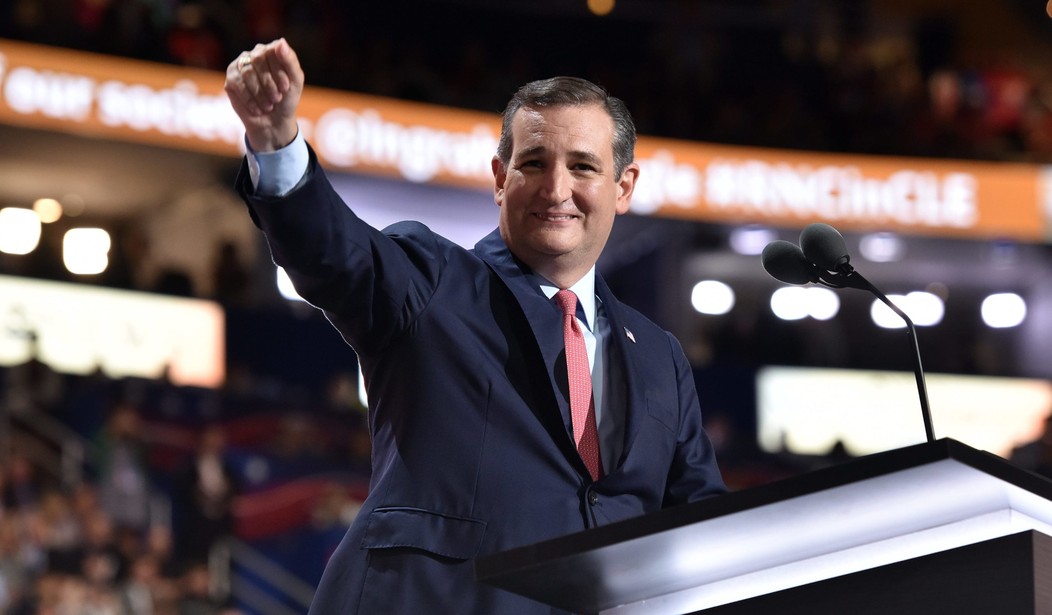Here’s Ted One, described by Newt Gingrich:
“Now I think you misunderstood one paragraph that Ted Cruz, who is a superb orator, said, and I just want to point it out to you, Ted Cruz said you can vote your conscience for anyone who will uphold the Constitution. In this election, there is only one candidate who will uphold the Constitution,” he said.
“So to paraphrase Ted Cruz, if you want to protect the Constitution of United States, the only possible candidate this fall is the Trump-Pence Republican ticket,” he added.
And here’s Ted Two, described by NPR’s Ron Elving:
Cruz stole the show by refusing to endorse the party’s now-official champion, who had allowed him a prime-time speaking spot on the night of Pence’s acceptance speech (and on the eve of Trump’s own). That sent everyone scrambling to history books for a precedent.
It also enraged the nominee’s backers in the hall. They exploded as if on cue, just at the point where Cruz urged his audience to vote “your conscience” in November “for candidates who share your principles, up and down the ballot.”
You don’t have to look that far back for a precedent. Ronald Reagan gave a fiery RNC speech about maintaining conservative principles in 1976, without ever endorsing his bitter primary rival, Gerald Ford. And I can’t find any mention of George Bush endorsing Reagan before accepting the Veep nod in 1980. A bit more recently, Reagan’s endorsement of Bush in 1988, long after the race was over, was best described as “tepid.”
But the question remains: Which Ted is the real Ted — the surreptitious Trump supporter described by Newt, or the divider-not-a-uniter Elving saw?
Before we try to answer that, here’s a third take from Roger L. Simon:
Ted Cruz did himself no favors when he declined to endorse Donald Trump Wednesday night, garnering a not unpredictable round of boos after he drew out the process almost interminably. The Texas senator seemed like a small man and decidedly not presidential. Positioning himself for a 2020 run at the presidency, should Trump lose, was reputed to be Cruz’s goal for the evening. If so, he did the reverse.
Keeping Reagan’s ’76 performance in mind, I’m less sure than Roger is that Cruz hurt himself. It also remains to be seen if Cruz helped himself…
I’m not saying that Cruz possesses Reagan’s skills, but it does seem apparent, or at least likely, that Cruz is using Reagan ’76 as a template. Reagan lost a divisive nomination fight to Ford, who let’s not forget was the sitting GOP president at the time. And that fight did him no favors four years later, when Reagan fought in an equally bitter open primary against a whole host of rivals.
Reagan chose establishment figure George H.W. Bush as his running mate in ’80, but only at the last minute after a deal fell through to name former President Ford as Veep. Reagan insider Richard Allen recounted the selection process back in 2000:
At precisely 11:38, the phone was in Reagan’s hand; though they barely knew each other, Reagan dove right in. ”George,” he said warmly, ”I would like to go over there and tell them that I am recommending you for vice president. Could I ask you one thing — do I have your permission to make an announcement that you support the platform across the board?” We could hear Bush agreeing at the other end. Reagan then left for the convention center where, shortly after midnight, he took the podium to praise Ford and then to announce his running mate, George Bush.
Allen also reminds readers that “Bush had refused to admit defeat in the primary battles despite being vanquished by Reagan in 29 of 33 primaries and did not withdraw from the race until just before the California primary in June.” After they kissed and made up, Reagan/Bush still weren’t a comfortable fit. It was joked (perhaps even fairly) while they served as POTUS and Veep together that Reagan never gave Bush anything more important to do than to attend state funerals overseas.
Cruz may then be borrowing from two playbooks. He emulated Bush’s decision in 1980 to stay in the race long past his sell-date, and Reagan’s decision in 1976 to wave the flag for conservatism rather than jump on board the GOP bandwagon.
This is of course a dangerous game Cruz is playing. He made no new friends last night, and probably made some new enemies. Being happy to be unliked has always been Cruz’s style, but that style did him no favors against Trump during the primaries. Reagan knew how to play political hardball, but that was tempered by his sunny disposition; Cruz all too often comes across as a lecturer or a scold. He became less so as the primaries wore on, but Cruz still has a ways to go before “likability” is even near the bottom on his list of political virtues. What we’ve witnessed these last three months then is a little Reagan, a little Bush, and a whole lotta Ted.
So we’re back to the question of which is the real Ted Cruz.
It’s Newt’s job as a party faithful and a Trump supporter to put the best possible spin on things at the RNC. And is so often the case, Cruz required industrial turbine-level spin to keep him oriented anywhere near the GOP establishment.









Join the conversation as a VIP Member